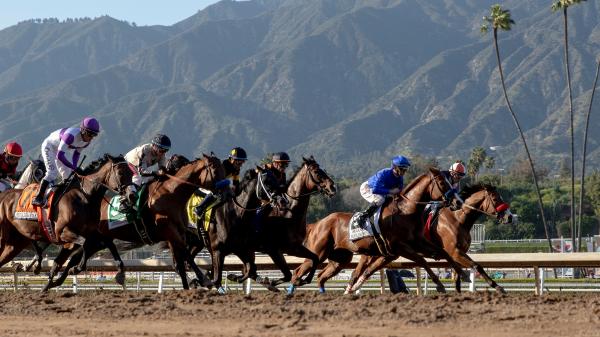Gambling
Santa Anita Park Gambling Tips and Trends: Do Great at ‘The Great Race Place’

Horse racing fans get to unwrap one final Christmas gift every year on Dec. 26 when the southern California winter racing season celebrates its traditional day-after-Christmas opening day at Santa Anita Park. The date marks the start of a new meet – called the Classic Meet – and kicks off one of the country’s premier annual winter racing seasons. The upcoming meet marks the 90th anniversary of the track, which opened in 1934-’35 and soon became one of the signature racetracks of the 20th century and into the 21st.
SoCal racing’s 2024-25 Classic Meet at “The Great Race Place” will continue on a mostly three-day-a-week basis, Fridays through Sundays plus holidays, until April 6. Racing at Santa Anita will then take a short break and continue with its spring racing season from April 18 until June 15 (called the Hollywood Meet as it picks up dates once held by now-closed Hollywood Park).
Santa Anita Park will host 78 race dates including the April-to-June part of the schedule. Some of the highlights of the meets will be the running of the Grade 1 Santa Anita Handicap on March 1 and the Grade 1 Santa Anita Derby on April 5.
Leading Santa Anita Jockeys
The favorite to win the Santa Anita Classic Meeting jockey title through April 6 is Juan Hernandez, who has won the last three winter (Classic) titles including 53 wins (22%) at last year’s meet. Hernandez added another 36 wins in the spring (Hollywood) portion of the 2024 meet, and also was the runaway leading jockey at the 2022-23 and 2021-22 Santa Anita winter meets including a 63-win season (25%) two years ago.
Antonio Fresu has continued to inch closer and closer to Hernandez at Santa Anita and may be able to launch another bid at winning the jockey title this season. He came up just one win short of the catching Hernandez for the spring title in 2024 after having finished second to Henandez at last year’s winter meet with 46 winners (18%).
The rest of the top 10 jockeys at last year’s Santa Anita 2023-24 Classic/winter meet in terms of wins were Flavien Prat, Frankie Dettori, Umberto Rispoli, Hector Berrios, Kyle Frey, Kazushi Kimura, Edwin Maldonado, and Tyler Baze.
Santa Anita Top Trainers
In the trainer standings, Doug O’Neill is the defending champion at the Classic meet after finishing with 31 wins from 163 starters for 19% last year. He unseated the previous year’s leading trainer, Phil D’Amato, who won the 2022-23 Santa Anita Classic meet with 32 wins (18%) to account for what, at the time, was his third straight meet title. D’Amato settled for third in the standings last year with 28 wins from 160 starters for 18%.
Bob Baffert has been very consistent the last two years at this Santa Anita meet, where he won 24 races from 89 starters (27%) last year in a season that was very similar to the year before when he won 27 races from 99 starters for an equal 27% winning percentage.
The trainer with the most momentum currently on the SoCal circuit is Mark Glatt, who won 23 races (21%) at the Classic meet two years ago and then moved all the way up to second in the standings last year when he won 29 races and posted a hefty 28% win percentage. You can expect that high level of success to continue this season based on Glatt’s big season at the recent Del Mar fall meet where he won the training title by a comfortable margin.
Other top Santa Anita winter trainers should include Steve Knapp (19 wins for 18% at last winter’s meet), John Sadler (18 wins, 17%), Jeff Mullins (16 wins, 19%), Michael McCarthy (15 wins, 16%), Richard Mandella (14 wins, 26%), and Peter Eurton (14 wins, 16%). Trainers like Peter Miller, George Papaprodromou and Richard Baltas will also win their share.
Santa Anita Main Track Trends
Let’s get to know “The Great Race Place” by taking a quick look at some prevailing biases at Santa Anita Park in various kinds of races based on the statistics from the same meet last year.
In terms of running style preferences and the winning track profile on the main track, speed tends to do very well in all sprints, especially at 5 ½ furlongs where 65% of the winners (11-of-17) raced on or close to the pace within a length of the lead. Speed in those races is especially deadly from the inside three posts.
At the most commonly run dirt sprint distance of six furlongs, speed was also very good with 57% of the winners (38-of-67) racing on or close to the pace. Only three of those 67 winners (4%) at six furlongs were closers that raced four or more lengths off the pace, so you better bet horses with at least tactical speed if you hope to have any chance to win these races.
The trends at 6 ½ furlongs and seven furlongs are more of the same with speed horses winning 19 of the 31 races (61%) at 6 ½ furlongs, while closers won only four of the 31 races (13%). At seven furlongs, speed horses won 10 of the 16 races accounting for 63% of the winners, while closers won just two of the 16 races. Early speed horses from the three inside posts are the best bets at seven furlongs. That segment of the starters won 7 of the 16 races (44%) run at seven furlongs last winter.
Santa Anita Dirt Routes
Most of Santa Anita’s routes this season will be run at one mile if the meet is anything like last year’s where 61 of the 75 routes were at a mile. Horses that race on or close to the lead tend to enjoy a tactical advantage at all distances on the Santa Anita main track, and this also includes routes. In the 75 route races run at Santa Anita at last year’s corresponding winter meet, 43 winners raced on or close to the pace (57% of all winners). Horses racing four or more lengths off the pace won only five of the 75 routes, a win percentage of only 7%, including four races at one mile and only one of the 14 longer routes run at the meet.
In terms of post positions in Santa Anita dirt routes, middle posts 4-6 did the best with winners in 42 of last year’s 75 dirt route races (56%). This was even better than horses from inside posts 1-3, who won 31 of the 75 dirt routes (41%). The average field size in Santa Anita dirt routes at this time of the year is just six horses per race, so the outside posts are rarely relevant.
Santa Anita Turf Tips
When it comes to grass racing, Santa Anita’s turf course is home to some of the country’s best over the winter. The Santa Anita turf course generally plays very fair to all running styles and running paths.
In Santa Anita turf routes, early speed horses as a group and stalkers coming from between one and four lengths off the pace as a group had roughly the same success last season, with the front-runners winning 39 of the 104 turf routes and stalkers winning 40 (38% of the races each). Closers had much less success with 25 wins to account for 24% of the races.
With an average field size of narrowly under eight horses per race, outside posts were not much of a factor, but it’s worth noting that those horses generally did well to win 21 races, which is statistically more than they should have won from a limited number of starters from those posts.
The other post position trend pertains mainly to speed horses, which won only eight times from inside posts 1-3, but did much better from middle draws. Speedsters from posts 4-6 won 23 of the 104 turf routes accounting for 22% of the overall winners of the turf routes run at the meet.
Trademark Santa Anita Turf Sprints
Santa Anita runs turf sprints at 6 ½ furlongs on its signature downhill course, as well as flat turf sprints from its newer backstretch turf sprint chute at 5 ½ furlongs, six furlongs, and 6 ½ furlongs (very rarely are races run at five furlongs).
The turf sprints starting on the backstretch have become much more prevalent at Santa Anita than the downhill sprints. These flat turf sprints have favored speedy types or horses able to stay within a length of the lead since their inception, but the stats from last year’s meet were pretty even between front-runners and stalkers, with only the closers from more than four lengths behind being at a disadvantage in these races. Inside and middle posts do the best, but outside posts aren’t terrible either.
In the downhill turf sprints, the course is used much less often than it used to be and there were only 23 downhill sprints run at last year’s corresponding meet. Data collected over many years and decades shows that those races favor horses with middle and outside posts while posts 1-2-3 have long been considered disadvantageous. These downhill sprints are generally fair to all running styles, and that was the case at last year’s meet where speedsters (eight), stalkers (eight), and closers (seven) split up the wins fairly evenly.
Have a great season at The Great Race Place. Best of luck at Santa Anita!










